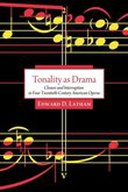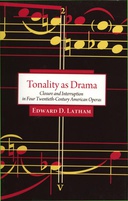Explore

This is an analytical monograph by a Schenkerian music theorist, but it is also written by one performer and enthusiast for another. Tonality as Drama draws on the fields of dramaturgy, music theory, and historical musicology to answer a fundamental question regarding twentieth-century music: why does the use of tonality persist in opera, even after it has been abandoned in other genres? Combining the analytical approaches of the leading music and dramatic theorists of the twentieth century--Austrian music theorist Heinrich Schenker (1868-1935) and Russian director Constantin Stanislavsky (1863-1938)--Edward D. Latham reveals insights into works by Scott Joplin, George Gershwin, Kurt Weill, and Aaron Copland that are relevant to analysts, opera directors, and performers alike. Latham reveals a strategic use of tonality in that repertoire as a means of amplifying or undercutting the success or failure of dramatic characters.
This book is included in DOAB.
Why read this book? Have your say.
You must be logged in to comment.
Rights Information
Are you the author or publisher of this work? If so, you can claim it as yours by registering as an Unglue.it rights holder.Downloads
This work has been downloaded 365 times via unglue.it ebook links.
- 110 - pdf (CC BY-NC-ND) at OAPEN Library.
- 158 - pdf (CC BY-NC-ND) at Unglue.it.
Keywords
- Analysis, appreciation
- Cadence
- George Gershwin
- Konstantin Stanislavski
- KUnlatched
- Kurt Weill
- Music
- Music / Genres & Styles
- Music / Genres & Styles / Opera
- Opera
- Operas
- Primary tone
- The arts
- thema EDItEUR::A The Arts::AV Music
- Tonic (music)
- Treemonisha
- Voice leading
Links
DOI: 10.26530/oapen_625265Editions


